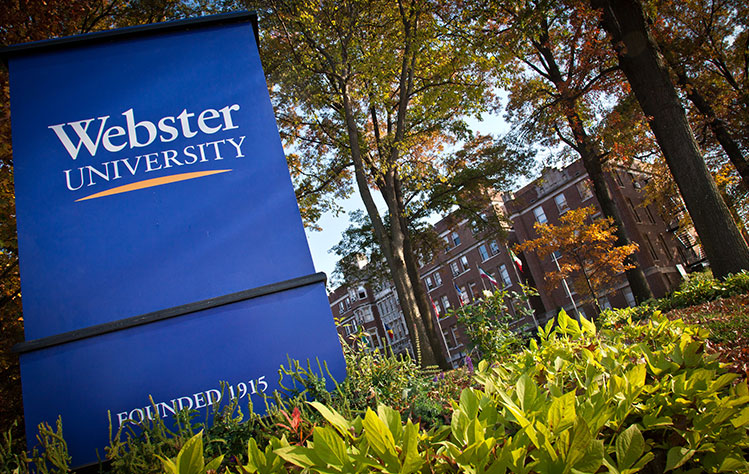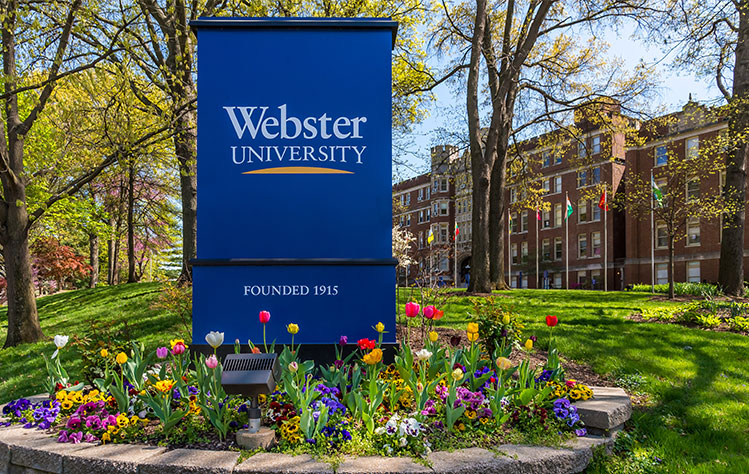Every attempt is made to help the student secure financing to meet personal needs.
Some options require the submission of appropriate documentation. All forms and vouchers for direct billing and tuition assistance should be emailed to thirdpartybill@webster.edu. The deferred payment plan option is located in Webster Connections and requires a deferred payment fee to be paid at the time of plan enrollment. The University reserves the right to refuse deferred payment privileges to any student whose account is overdue or has been overdue in the past.
Electronic check payments may be made online through Connections (requires login). Webster University accepts MasterCard, Discover, Visa or American Express payments online with a convenience fee outlined below. Cashiers also accept cash, money orders and personal checks payable to Webster University.
- Domestic card payments will be 2.95% effective July 1, 2024
- International card payment will be 4.25%
- Minimum service fee for transactions over $20 but less than $106 will be $3
Students are financially responsible for all courses not officially dropped by the deadline. Webster University reserves the right to withhold transcripts and diplomas, and refuse enrollment for future terms, if any tuition or other fees or charges owed to the University are not paid when due. A 10-day hold on student accounts is enforced when a personal check payment is applied to a balance prior to the hold being released for registration. In the event an account is referred to an agency or attorney for collection, a 25% fee will be added to the unpaid balance, and the student promises to pay, in addition to all amounts otherwise due to Webster University, the costs and expenses of such collection and/or representation, including, without limitation, reasonable attorneys' fees and expenses (whether or not litigation is commenced), to the extent permitted by applicable law.
Advance deposit payments are nonrefundable unless otherwise stated for specific academic programs. Non-refundable tuition deposits will be forfeited when a student withdraws from their academic program. Please refer to Webster University's Graduate/Undergraduate Catalog regarding additional information on non-refundable tuition deposits.
Payment Options
Billing statements will be emailed each month to all students through their Connections email, and authorized payers. Students will continue to receive statements while a balance remains on account, regardless of payment option selected.
How will you pay?
This payment option encompasses students who are participating in the Department of Education Title IV programs. Student financial aid is based upon compliance with the terms and conditions set forth on the student's financial aid award.
Each student who is taking out loans will receive a packet from their lender once the promissory note is signed. Inside the packet there should be a disclosure statement that shows the disbursement amount, the expected date that the loans will be released to the school, and the lender's contact phone numbers.
If the student drops or withdraws credit hours within the award period, the award may be recalculated and funds may have to be reduced or canceled. Students will need to reapply for loan funds following the break in enrollment. Students are responsible for any balance owed due to a reduction in the financial aid awarded.
Under no circumstance is a prior academic year balance allowed to be carried forward into a new academic year. Prior academic year balances must be paid prior to new registrations.
Private educational loans are available to eligible students and are provided by outside financial institutions. As loan processing depends on operations inside and outside of Webster University, please allow for 6–8 weeks processing time. Students may contact their lender with status inquiries.
If a student is receiving a loan from an outside lender, the funds may be sent to Webster University or a loan check may be made copayable to the student and Webster University. If the student's account is paid in full, the University may endorse the check and release it directly to the student. If a balance is due on the student account, those checks must be credited to the student account. Students will be contacted by the Business Office in order to obtain the student's endorsement as required by the Uniform Commercial Code Article 3, Subsection 110, item D.
Once an outside loan arrives at the University, Financial Aid will validate student enrollment and apply loan funds or forward any loan check to the Business Office. The Business Office will notify the student with a phone call if a loan endorsement is necessary. If the cashier cannot reach the student, an email notification will be sent to the student's Webster email address.
If you are employed by a company that requires direct billing of tuition, choose this option. This usually refers to “private” employers (companies). This option should not be used for civil service employees (form SF-182) who should be coded as TA, or Vocational Rehabilitation students who should be coded as VR. Submit vouchers, letters of credit, or other authorization forms to thirdpartybill@webster.edu two weeks before your class begins, or at the time of registration.
If the employer will not cover 100% of the tuition, the student must pay their portion at the time of registration or have the remaining portion covered by another payment option. Transcripts are not released when an unpaid balance exists.
If you are eligible for tuition benefits from the U.S. military, civil service, or the federal government as an employee, choose this option. Typically this involves forms SF-182, 2171, 1227, etc. Submit forms to thirdpartybill@webster.edu two weeks before the term begins, or at the time of registration. Because active duty members of the Army register for classes through the GoArmyEd portal there are no TA forms required. For assistance, see this helpful checklist (requires login).
If Tuition Assistance will not cover 100% of the tuition, the student must pay their portion at the time of registration or have the remaining portion covered by another payment option.
Top-up Program — If you participate in the Top-up Program, also select 'VA' as a secondary payment option. The Top-up portion is due as a VA payment, at the beginning of the academic term, whether the Top-up Program has completed your reimbursement or not. Transcripts are not released when an unpaid balance exists.
For tuition assistance programs, service members should begin the process by contacting their education advisors or ESOs or seek approval from installation commanders.
Sponsorship documents and forms will be applied to the student account as a conditional credit. Conditional credits do not signify that a payment from the sponsoring entity was received by the University. Conditional credits are subject to change based on payments received.
The sponsoring government/military entity dictates what will and will not be paid — regardless of what has been invoiced. They have the final authority on tuition and fee-related payments, which could change the conditional credits applied to the account.
The Veteran Readiness and Employment (VR&E) program is authorized by Congress under Title 38 of the United States Code, Chapter 31. The purpose of this program is to provide services and assistance necessary to enable veterans with service-connected disabilities to achieve maximum independence in daily living and, to the maximum extent feasible, to become employable and to obtain and maintain suitable employment.
Webster University's policy requests students to submit their Certificate of Eligibility (COE) to their certifying official on or before the first date of class to avoid potential registrations. If the COE is submitted on time, this policy ensures that Webster University will not impose any penalty, including the assessment of late fees, the denial of access to classes, libraries or other institutional facilities, or the requirement that a covered individual borrow additional funds, on any covered individual because of the individual's inability to meet their financial obligations to the institution due to the delayed disbursement of a payment to be provided by the Secretary under chapter 31 or 33 of this title (for up to 90 days). See the Veterans Benefit and Transition Act of 2018 for more information.
Certification questions for online and St. Louis courses should be directed to Webster University's Registrar's Office. Questions for extended site courses should be directed to the student's extended campus.
Students who have been certified for Post-9/11 VA benefits should see their VA payments posted directly to their student accounts. Students are responsible for following up with the certifying official and the VA on unpaid amounts.
Webster University's policy requests students to submit their Certificate of Eligibility (COE) to their certifying official on or before the first date of class to avoid potential registrations. If the COE is submitted on time, this policy ensures that Webster University will not impose any penalty, including the assessment of late fees, the denial of access to classes, libraries or other institutional facilities, or the requirement that a covered individual borrow additional funds, on any covered individual because of the individual's inability to meet their financial obligations to the institution due to the delayed disbursement of a payment to be provided by the Secretary under chapter 31 or 33 of this title (for up to 90 days). See the Veterans Benefit and Transition Act of 2018 for more information.
The Yellow Ribbon program is a provision of the Post-9/11 Veterans Educational Assistance Act of 2008. This program, effective Aug. 1, 2009 allowed Webster to voluntarily enter into an agreement with the VA to fund tuition expenses, for qualified veterans that exceed the highest public in-state undergraduate tuition rate. Webster University will be listed on the Yellow Ribbon Program website as participating in states where Webster's tuition rate (undergraduate or graduate) is higher than this limit.
Webster University will waive 50% of those excess charges, and the VA will pay the remaining 50% difference. Eligible students who have been certified for these benefits should see their VA wire payments and waiver amounts post directly to their student account. Webster will only offer a tuition discount to eligible veterans certified at 100%. Veterans must present a certificate of eligibility to the campus before the enrollment can be processed.
The VA option may be used by students utilizing VA Benefits such as Chapter 35 VA education benefits for survivors and dependents. With this benefit, the student is paid directly from the VA.
Certification questions for online and Saint Louis courses should be directed to Webster University's Registrar's Office. Questions for extended site courses should be directed to the student's extended campus.
Helpful Links
Below are commonly requested links. Current Webster students can also use our Connections page (requires login) for additional help.
- Undergraduate Tuition Rates
- Graduate Tuition Rates
- Financial Aid
- Housing and Residential Life
- Student Health Services
- Frequently Asked Questions (requires login)
- View Student Account and Monthly Statements (requires login)
- Financial Responsibility and Payment Options (requires login)
- BankMobile Disbursements — Refund Partner
- Refunds and Withdrawal Waivers (requires login)
- Payment Plan Enrollment Guide (requires login)
- Money for Textbooks Program (requires login)
- Finance Hold Amount Tripled (requires login)
- Form 8300 (requires login)
- Visit our Facebook!


